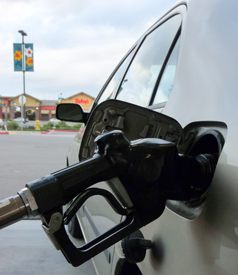Washington – The next big thing from Detroit may not just be a new car, but a new car industry: Transformed, modern and competitive.
This month, with traditional fanfare, Detroit is launching the new model year. More quietly, the Obama administration is preparing to help shape the cars we will be driving six years from now. In coming weeks, it will unveil the first draft of standards for fuel efficiency and emissions beginning with the 2017 model year.
The challenge facing the Environmental Protection Agency and Department of Transportation is to set standards tough enough to revitalize the industry. They will bring savings at the pump, reduce global warming pollution and cut our oil addiction and the risks that go with it. They will transform the car industry by transforming the car.
This is a unique opportunity. As auto makers emerge from bankruptcy, strong emissions and fuel-mileage standards can ignite American know-how – the country’s greatest resource. With the best American technology, by 2025, Detroit could build safe, clean, 21st century cars that average at least 60 miles per gallon (mpg) – and deliver 21st century jobs.
The administration would build on the current auto emissions rules and the Corporate Average Fuel Economy (CAFE) standard, under which the fleet of new cars sold in the United States in 2016 must average 35.5 mpg.
As it looks to the cars, SUVs, minivans and pickups it will build from 2017 to 2025, Detroit needs a healthy shove from Washington. That’s why the administration needs to set a standard of at least 60 mpg.
Only if challenged by strong pollution and fuel efficiency standards will US automakers deliver cars that begin to meet the foreign competition, lessen our oil dependence, reduce pollution and save consumers money at the pump.
Detroit has always looked for ways to tweak rather than transform. The auto companies’ default position is to say they can’t meet the standards set for them – but they can squeeze in more cup holders.
This is the industry that said, “We can’t make cars with seat belts. We can’t make cars with airbags. We can’t make cars with catalytic converters.” But when the rules are final, somehow they always manage to do it. There is no reason that 15 years from now the average car can’t improve on the mileage of today’s Prius.
This isn’t rocket science. It is auto mechanics. Detroit needs to use existing technology – better engines and transmissions and high-strength, lightweight materials – to boost fuel efficiency and cut tailpipe pollution for all types of vehicles, expand production of hybrids and begin to build lots of electric vehicles.
But automakers are lobbying for a loophole. It would tell the Environmental Protection Agency that when the agency tallies the carbon emissions attributed to each car, it cannot count pollution from the power plants that generate electricity on which electric vehicles (EVs) run.
Ignoring such pollution would allow automakers to produce more gas guzzlers while not technically violating government pollution limits. Let’s not allow the auto companies to make more behemoths just because they are grudgingly turning out EVs.
The Obama administration’s new standards must tell Detroit to reach into its well of ingenuity and deliver cars and light trucks that transform the American auto industry.
American engineers put men on the moon 41 years ago. We all know they can get us out of our driveways and back on fewer gallons of gas.
Join us in defending the truth before it’s too late
The future of independent journalism is uncertain, and the consequences of losing it are too grave to ignore. To ensure Truthout remains safe, strong, and free, we need to raise $44,000 in the next 6 days. Every dollar raised goes directly toward the costs of producing news you can trust.
Please give what you can — because by supporting us with a tax-deductible donation, you’re not just preserving a source of news, you’re helping to safeguard what’s left of our democracy.
